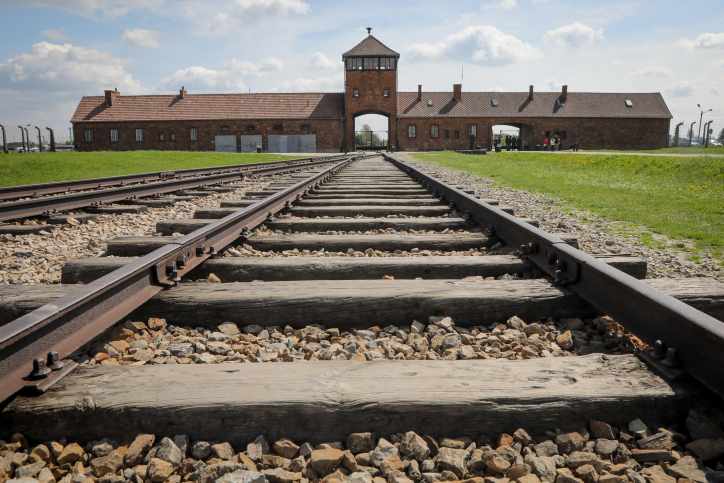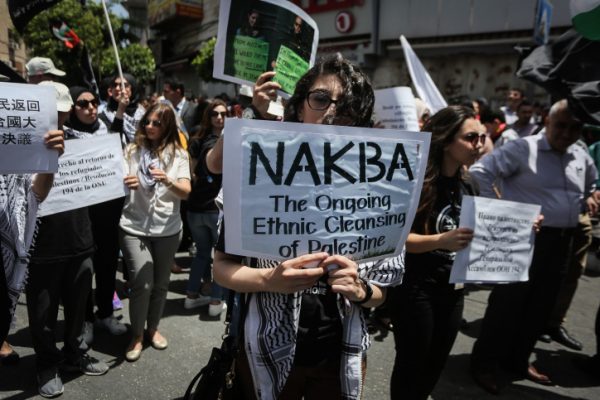Poland’s attempt to scrub clean its role in the murder of European Jewry is, at its core, no different from Israel’s attempt to erase the catastrophe that befell the Palestinians in 1948.
By Haneen Zoabi

The responses coming from Israel to the new Polish law, which forbids discussing war crimes committed by the Polish people during the holocaust, are nothing if not paradoxical. While the Israeli establishment, from the Right to the Left, denies the identity, history, and catastrophe of the Palestinian people, it reprimands those who deny responsibility for the fate of the Jews during the Holocaust.
The Holocaust, a monstrous, well-planned genocide, was possible not only because of the Nazis’ nightmarishly meticulous implementation, but also because those who stood aside as it was happening. The Germans had willing accomplices, including many Poles, who took an active part in the persecution and murder. The history books talk about the “hunt for the Jews,” which led to the murder of hundreds of thousands of Jews, both directly and indirectly, during the Second World War.
The president of Poland — not the Polish state — from the right-wing Law and Justice party, denies the involvement of Polish citizens in the murder of Jews during the Holocaust, and is attempting to promote a “new strategy in historical policy.” The new law, which criminalizes any researcher who dares publish the truth, is an attempt at historical revisionism. There is no doubt that the Nazis, who planned the Final Solution, were the ones who carried out the crimes, yet many Poles gladly cooperated with them.
To what extent were those Poles different from other European nations? What could really be done in the face of the well-oiled Nazi machine? Only few took the risk and offered protection to Jews. How many really provided shelter, food, or help to them during those years? Most stood aside and ignored what was happening, perhaps out of helplessness or unwillingness to help. And yet, there is a still a big difference between “not helping” and actively joining the hunters. That is why the Polish law is problematic: it is an attempt to criminalize truth tellers and rewrite history. The uproar, then, is entirely justified.
A state in denial
So how is this law any different from the Nakba Law, which would withhold state funds from cultural and educational institutions that commemorate the horrors that befell the Palestinians in 1948? Isn’t the Nakba Law also an attempt to rewrite history? To hide and deny certain parts of it? It is true that the Nakba Law does not — yet — criminalize individuals. But in its essence, it is a law that seeks to silence, just as the Polish law does, and allows the effective denial of the Palestinian catastrophe.

As opposed to Poland, which legislated this disgraceful law at the behest of its right-wing president, the Zionist state was established entirely on denying my identity, and my connection to my homeland. One example of that denial is the artificial separation between “Israeli Arabs” and Palestinians. “Arab MKs must take care of ‘Israeli Arabs,’ not the Palestinians,” we are told over and over again. The term is one of domestication — of denial — and I am expected to identify with it, to adopt that separation.
There is no doubt that the Polish law is wrong. But it is no less wrong than the Nakba Law. Yet the Polish law does not deny the Holocaust, while the Israeli law denies the Nakba. The Polish law denies that part of the Polish people were responsible for the Holocaust — that is, it distinguishes between the crime and the criminals. The latter are “the others,” the bad guys, the Nazis. The Poles were “okay,” they were victims of the Third Reich, just like the Jews.
The Nakba Law, on the other hand, denies history itself, since according to the law the Nakba never actually took place. Instead, there were Palestinian villages whose residents rejected the Partition Plan and “voluntarily” left their villages “with the expectation that they would return after a few days.” There was no expulsion, no murder, and no home demolitions. The events at Deir Yassin were an outlier — if they even happened in the first place.
The Nakba Law is the natural result of a process that began long ago. Moreover, the state’s use of the Holocaust is no worse than Holocaust denial. The Holocaust has turned into a political tool to be used against anyone who dares criticize the state. Accusations of anti-Semitism have become a way to defend Israel, which claims to represent world Jewry.

We, the native Palestinians of this land, blame Israeli society, in its entirety, for its historical indifference and blindness. We accuse it of denying our existence, our identity, and the crimes carried out by the state until this very day — on both sides of the Green Line.
As a Palestinian, I feel a kinship with the victims of the Holocaust. I am angry at all those who continue to murder and remain silence, those who force others to remain silent.
Israel expels, denounces, and persecutes not only Palestinians, but anyone who identifies with them: human rights activists, parliamentarians, BDS supporters. Israel needs a world beset by fear — one that sees what is happening and remains silent. Just like Poland.
Haneen Zoabi is a member of Knesset for the Balad party. This article was first published in Hebrew on Local Call. Read it here.
